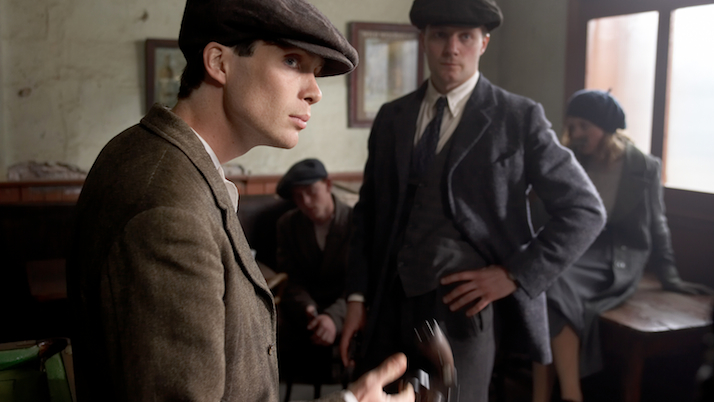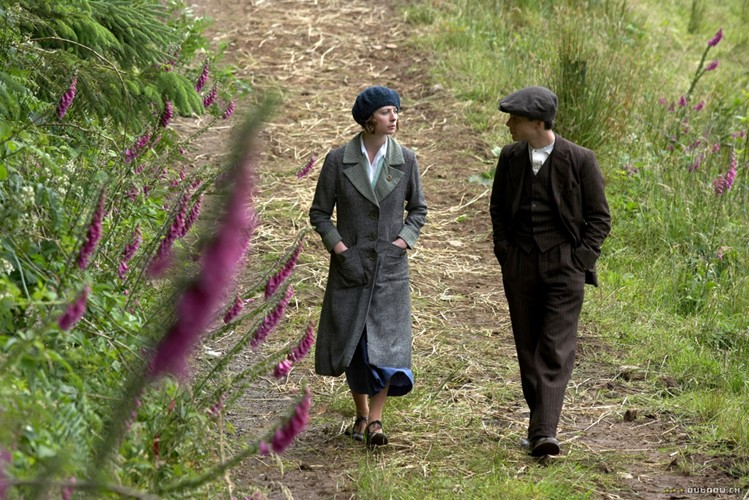
Directed by Ken Loach
Screenplay by Paul Laverty
Ireland, 2006
More commonly associated with hard hitting, often brutal kitchen sink drama and gritty small scale drama, Ken Loach’s film repertoire has earned him a critically acclaimed niche in cinema’s fickle hall of fame. Ever since Kes, his name has been synonymous with working class misery occasionally tempered by strains of gallows humor, always respected but often silently shunned due to his often uncomfortable levels of authenticity. It’s something of a surprise then that his most successful effort is a million miles away from shabby council flats, and instead is the Nuneaton born auteur’s take on the sweeping epic.
The Wind That Shakes the Barley proves to be the perfect adventure for Loach, a narratively huge fable with decidedly small and modest themes, a fundamentally modest conflict between two brothers set amidst the more world shattering Irish war of independence and subsequent civil war in the 1920’s. The central duo couldn’t be any more different; educated and peaceful doctor Damien O’Donovan (Cillian Murphy) is off to London in search of a fruitful career, while older sibling Teddy (Padraic Delaney) is a militantly minded officer in stunted revolutionary group the Irish Republican Army.
The iron fist of the British occupation ultimately draws the pair together, and the normally passive Damien is driven to join his brother’s cause after witnessing unjust examples of brutality, intimidation and summary executions by the fascist black and tan brigades. Leading an ever swelling group of partisans, the O’Donovans mount a series of guerilla actions against their tormentors, each act escalating and leading to greater degrees of retribution. Eventually, their crusade becomes a nationwide movement, tentatively and conditionally changing the balance of power in their native land. But with new found apparent freedom comes dispute and quarrel, causing a rift that pits the O’Donovans against one another as they each pursue very different visions of new Ireland.
It’s in the handling of this material that Loach’s character driven, fly on the wall style sensibilities really come to the fore. In different hands, the plot would have worked out as a Braveheart-style rabble rousing call to arms. Instead it plays like it really should; ordinary people with understandable motives pushing for big goals with realistic conflicts and traumas, depicting the uprising as a modest personal drama shorn of political slant or bias. This means that while the action sequences lack the panache of Hollywood, the scenes of debate and disagreement between the patriots are both enthralling and compellingly believable. Methods such as non-rehearsals of wordy exchanges creates a sense that we are not indulging in a distilled glamorized account of pivotal moments in recent British history, but are actually there for the count.
Loach’s long term collaborator Paul Laverty is key to making this work, as his screenplay thrives on little man dialogue and morally ambiguous actions. This rings particularly true of the film’s later stages, when the war with the British has been replaced by the turmoil of infighting, adrenaline strung fighters raising differing banners to the tune of uncorked verbal fervor. What started out as an inspirational fight against oppression devolves into murky, ill-fated argument and Greek tragedy, none of which is treated to point scoring or side taking.
As the brothers who form the composed emotional heart of the film, Cillian Murphy and Padraic Delaney shine, both delivering brilliant character studies of fully authentic strife and almost lamentable character development. In particular, Murphy’s gradual transformation from mild mannered would-be healer into passionate speech delivering standard bearer is remarkable, somehow both dramatic and seamless. There’s also great work from the supporting cast, particularly the ever reliant Liam Cunningham and Orla Fitzgerald as Damien’s love interest Sinead, a subtly employed example of what the cause is fighting for.
Simply adding to the experience is the cinematography, gorgeously shot vistas of rural and mountainous Ireland alongside immaculate period designs setting the stage and showing off Loach’s best visual work. Arduous attention to historical detail is again understated, dictating the mise-en-scene and narrative backdrop without ever being showy or distracting from the key action.
Such a grand work brought to screen by Ken Loach’s sensibilities makes sure that The Wind That Shakes the Barley is not only a nourishing, emotional and compelling human story with wider implications, but one that is uniquely driven by character and personal drama rather than by the scale of events. Rarely has a simple tale of two brothers defined by the events of history unfurled in such an intimate, honest and intelligent manner. Common tropes redefined by a director’s expert handle on humanity, and essential viewing as a result.
Scott Patterson




